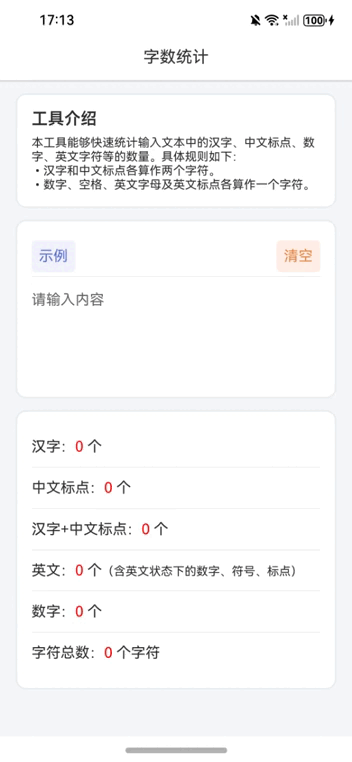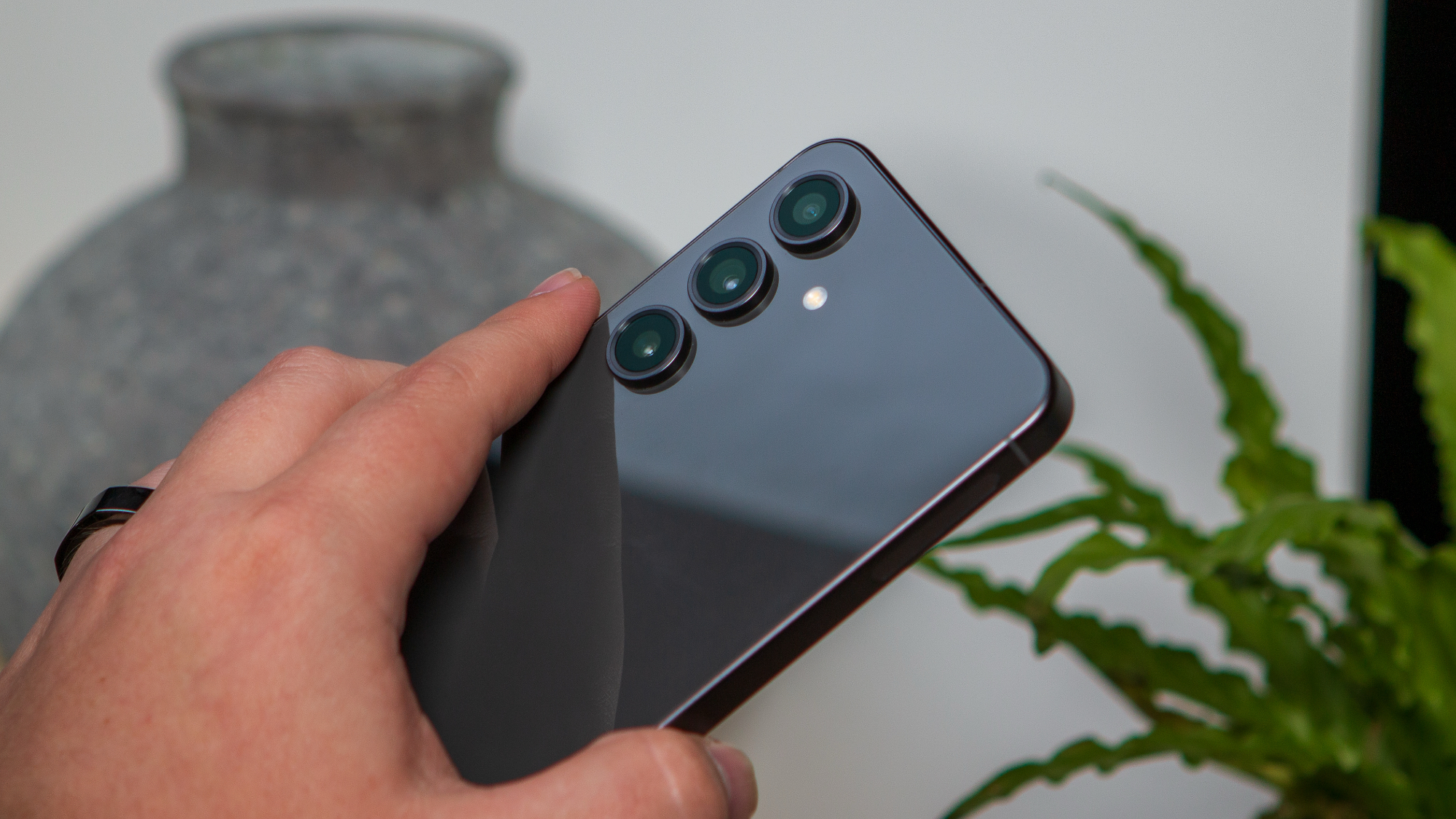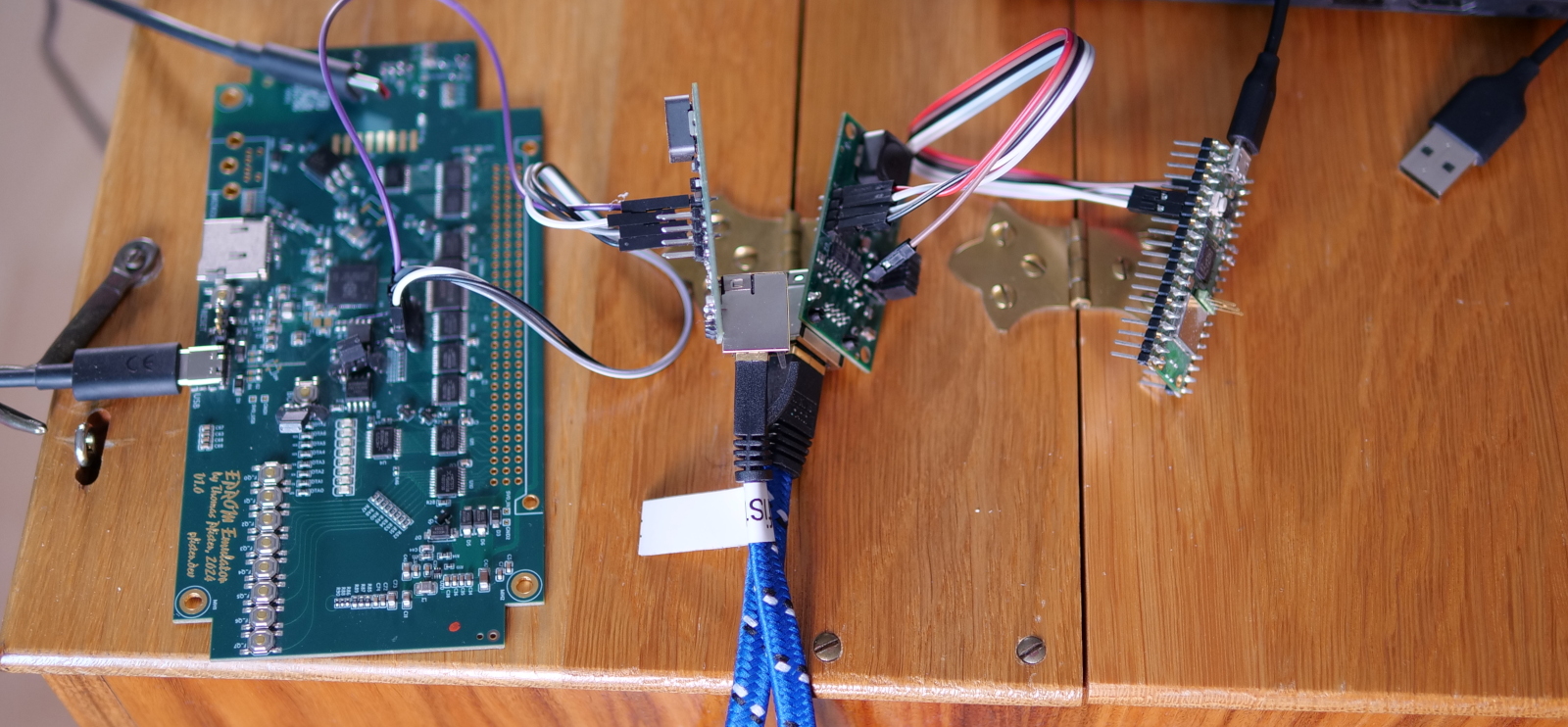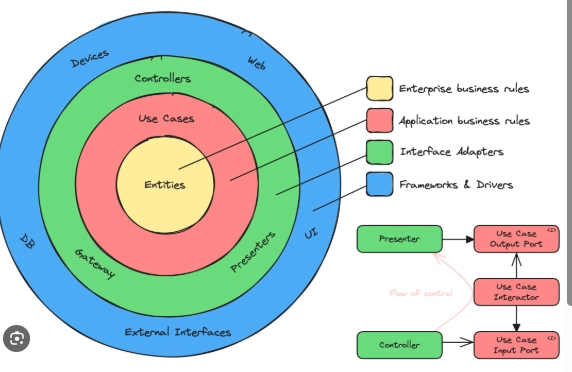HarmonyOS NEXT Development Case: Character Count Statistics
The following code demonstrates how to create a character counting component in HarmonyOS NEXT that can handle mixed Chinese and English text input while implementing specific counting rules. // Define a component for number and text statistics @Entry @Component struct NumberToChineseConverter { // State variable storing example number string @State private exampleNumber: string = '自从盘古破鸿蒙,开辟从兹清浊辨。\nare you ok?\n1234\n+-*/'; // Text color state variable @State private textColor: string = "#2e2e2e"; // Shadow border color state variable @State private shadowColor: string = "#d5d5d5"; // Base padding state variable @State private basePadding: number = 30; // Chinese character count state variable @State private chineseCharCount: string = "0"; // Chinese punctuation count state variable @State private chinesePunctuationCount: string = "0"; // Total Chinese characters + punctuation state variable @State private totalChineseCount: string = "0"; // English character count state variable @State private englishCharCount: string = "0"; // Digit count state variable @State private digitCount: string = "0"; // Total character count state variable @State private charTotalCount: string = "0"; // Input text state variable with change listener @State @Watch('inputChanged') private inputText: string = ""; // Method called when input text changes inputChanged() { // Initialize counters let chineseChars = 0; // Chinese characters let chinesePunctuation = 0; // Chinese punctuation let englishChars = 0; // English characters let digits = 0; // Digits let count = 0; // Total characters // Iterate through each character for (let i = 0; i { this.inputText = this.exampleNumber; }); Blank(); Text('Clear') .fontColor("#e48742") .fontSize(16) .padding(`${this.basePadding / 2}lpx`) .clickEffect({ level: ClickEffectLevel.LIGHT, scale: 0.8 }) .backgroundColor("#ffefe6") .borderRadius(5) .onClick(() => { this.inputText = ""; }); } .height(45) .justifyContent(FlexAlign.SpaceBetween) .width('100%'); Divider(); TextArea({ text: $$this.inputText, placeholder: `Input text here` }) .width(`${650 - this.basePadding * 2}lpx`) .height(100) .fontSize(16) .caretColor(this.textColor) .fontColor(this.textColor) .margin({ top: `${this.basePadding}lpx` }) .padding(0) .backgroundColor(Color.Transparent); } .alignItems(HorizontalAlign.Start) .width('650lpx') .padding(`${this.basePadding}lpx`) .margin({ top: `${this.basePadding}lpx` }) .borderRadius(10) .backgroundColor(Color.White) .shadow({ radius: 10, color: this.shadowColor }); // Statistics display section Column() { // Multiple Rows showing different counts... // (Similar structure to Chinese version with English translations) } .alignItems(HorizontalAlign.Start) .width('650lpx') .padding(`${this.basePadding}lpx`) .margin({ top: `${this.basePadding}lpx` }) .borderRadius(10) .backgroundColor(Color.White) .shadow({ radius: 10, color: this.shadowColor }); } } .scrollBar(BarState.Off) .clip(false); } .height('100%') .width('100%') .backgroundColor("#f4f8fb"); } } Key Features Character Counting Rules Chinese characters and punctuation count as 2 units Digits, English characters, and symbols count as 1 unit Real-time updates through @Watch decorator UI Components Clean material design with shadow effects Scrollable container for responsive layout Example/Clear buttons with click effects Thematic color scheme management Technical Highlights Regular expressions for character classification State management with @State decorators Responsive layout using lpx units Component-based architecture This implementation demonstrates HarmonyOS NEXT's capabilities in building responsive, feature-rich applications with clean state management and modern UI components.


The following code demonstrates how to create a character counting component in HarmonyOS NEXT that can handle mixed Chinese and English text input while implementing specific counting rules.
// Define a component for number and text statistics
@Entry
@Component
struct NumberToChineseConverter {
// State variable storing example number string
@State private exampleNumber: string = '自从盘古破鸿蒙,开辟从兹清浊辨。\nare you ok?\n1234\n+-*/';
// Text color state variable
@State private textColor: string = "#2e2e2e";
// Shadow border color state variable
@State private shadowColor: string = "#d5d5d5";
// Base padding state variable
@State private basePadding: number = 30;
// Chinese character count state variable
@State private chineseCharCount: string = "0";
// Chinese punctuation count state variable
@State private chinesePunctuationCount: string = "0";
// Total Chinese characters + punctuation state variable
@State private totalChineseCount: string = "0";
// English character count state variable
@State private englishCharCount: string = "0";
// Digit count state variable
@State private digitCount: string = "0";
// Total character count state variable
@State private charTotalCount: string = "0";
// Input text state variable with change listener
@State @Watch('inputChanged') private inputText: string = "";
// Method called when input text changes
inputChanged() {
// Initialize counters
let chineseChars = 0; // Chinese characters
let chinesePunctuation = 0; // Chinese punctuation
let englishChars = 0; // English characters
let digits = 0; // Digits
let count = 0; // Total characters
// Iterate through each character
for (let i = 0; i < this.inputText.length; i++) {
let char = this.inputText.charAt(i);
count++;
if (/\d/.test(char)) {
digits++;
}
if (/[\u4e00-\u9fa5]/.test(char)) {
chineseChars++;
count++; // Chinese characters count as 2 units
}
if (/[\u3001-\u3002\uff01-\uff1a]/.test(char)) {
chinesePunctuation++;
count++; // Chinese punctuation counts as 2 units
}
if (/[a-zA-Z0-9\s!-/:-@[-`{-~]/.test(char)) {
englishChars++;
}
}
// Update state variables
this.chineseCharCount = `${chineseChars}`;
this.chinesePunctuationCount = `${chinesePunctuation}`;
this.totalChineseCount = `${chineseChars + chinesePunctuation}`;
this.englishCharCount = `${englishChars}`;
this.digitCount = `${digits}`;
this.charTotalCount = `${count}`;
}
// UI construction method
build() {
Column() {
Text('Character Counter')
.fontColor(this.textColor)
.fontSize(18)
.width('100%')
.height(50)
.textAlign(TextAlign.Center)
.backgroundColor(Color.White)
.shadow({
radius: 2,
color: this.shadowColor,
offsetX: 0,
offsetY: 5
});
Scroll() {
Column() {
// Tool introduction section
Column() {
Text('Tool Description').fontSize(18).fontWeight(600).fontColor(this.textColor);
Text('This tool quickly counts characters in input text, including Chinese characters, punctuation, digits, and English characters. Rules:\n• Chinese characters and punctuation count as 2 units\n• Digits, spaces, and English characters count as 1 unit')
.textAlign(TextAlign.JUSTIFY)
.fontSize(13)
.fontColor(this.textColor)
.margin({ top: `${this.basePadding / 2}lpx` });
}
.alignItems(HorizontalAlign.Start)
.width('650lpx')
.padding(`${this.basePadding}lpx`)
.margin({ top: `${this.basePadding}lpx` })
.borderRadius(10)
.backgroundColor(Color.White)
.shadow({ radius: 10, color: this.shadowColor });
// Example and Clear section
Column() {
Row() {
Text('Example')
.fontColor("#5871ce")
.fontSize(16)
.padding(`${this.basePadding / 2}lpx`)
.backgroundColor("#f2f1fd")
.borderRadius(5)
.clickEffect({ level: ClickEffectLevel.LIGHT, scale: 0.8 })
.onClick(() => {
this.inputText = this.exampleNumber;
});
Blank();
Text('Clear')
.fontColor("#e48742")
.fontSize(16)
.padding(`${this.basePadding / 2}lpx`)
.clickEffect({ level: ClickEffectLevel.LIGHT, scale: 0.8 })
.backgroundColor("#ffefe6")
.borderRadius(5)
.onClick(() => {
this.inputText = "";
});
}
.height(45)
.justifyContent(FlexAlign.SpaceBetween)
.width('100%');
Divider();
TextArea({ text: $$this.inputText, placeholder: `Input text here` })
.width(`${650 - this.basePadding * 2}lpx`)
.height(100)
.fontSize(16)
.caretColor(this.textColor)
.fontColor(this.textColor)
.margin({ top: `${this.basePadding}lpx` })
.padding(0)
.backgroundColor(Color.Transparent);
}
.alignItems(HorizontalAlign.Start)
.width('650lpx')
.padding(`${this.basePadding}lpx`)
.margin({ top: `${this.basePadding}lpx` })
.borderRadius(10)
.backgroundColor(Color.White)
.shadow({ radius: 10, color: this.shadowColor });
// Statistics display section
Column() {
// Multiple Rows showing different counts...
// (Similar structure to Chinese version with English translations)
}
.alignItems(HorizontalAlign.Start)
.width('650lpx')
.padding(`${this.basePadding}lpx`)
.margin({ top: `${this.basePadding}lpx` })
.borderRadius(10)
.backgroundColor(Color.White)
.shadow({ radius: 10, color: this.shadowColor });
}
}
.scrollBar(BarState.Off)
.clip(false);
}
.height('100%')
.width('100%')
.backgroundColor("#f4f8fb");
}
}
Key Features
-
Character Counting Rules
- Chinese characters and punctuation count as 2 units
- Digits, English characters, and symbols count as 1 unit
- Real-time updates through @Watch decorator
-
UI Components
- Clean material design with shadow effects
- Scrollable container for responsive layout
- Example/Clear buttons with click effects
- Thematic color scheme management
-
Technical Highlights
- Regular expressions for character classification
- State management with @State decorators
- Responsive layout using lpx units
- Component-based architecture
This implementation demonstrates HarmonyOS NEXT's capabilities in building responsive, feature-rich applications with clean state management and modern UI components.










































































![Apple M4 MacBook Air Hits New All-Time Low of $824 [Deal]](https://www.iclarified.com/images/news/97288/97288/97288-640.jpg)
![An Apple Product Renaissance Is on the Way [Gurman]](https://www.iclarified.com/images/news/97286/97286/97286-640.jpg)
![Apple to Sync Captive Wi-Fi Logins Across iPhone, iPad, and Mac [Report]](https://www.iclarified.com/images/news/97284/97284/97284-640.jpg)
![Apple M4 iMac Drops to New All-Time Low Price of $1059 [Deal]](https://www.iclarified.com/images/news/97281/97281/97281-640.jpg)












![[Fixed] Gemini 2.5 Flash missing file upload for free app users](https://i0.wp.com/9to5google.com/wp-content/uploads/sites/4/2025/03/google-gemini-workspace-1.jpg?resize=1200%2C628&quality=82&strip=all&ssl=1)


![As Galaxy Watch prepares a major change, which smartwatch design to you prefer? [Poll]](https://i0.wp.com/9to5google.com/wp-content/uploads/sites/4/2024/07/Galaxy-Watch-Ultra-and-Apple-Watch-Ultra-1.jpg?resize=1200%2C628&quality=82&strip=all&ssl=1)






























































































































































































































![[The AI Show Episode 146]: Rise of “AI-First” Companies, AI Job Disruption, GPT-4o Update Gets Rolled Back, How Big Consulting Firms Use AI, and Meta AI App](https://www.marketingaiinstitute.com/hubfs/ep%20146%20cover.png)


































































































































































![Ditching a Microsoft Job to Enter Startup Purgatory with Lonewolf Engineer Sam Crombie [Podcast #171]](https://cdn.hashnode.com/res/hashnode/image/upload/v1746753508177/0cd57f66-fdb0-4972-b285-1443a7db39fc.png?#)


![[DEALS] Internxt Cloud Storage Lifetime Subscription: 10TB Plan (88% off) & Other Deals Up To 98% Off – Offers End Soon!](https://www.javacodegeeks.com/wp-content/uploads/2012/12/jcg-logo.jpg)
































































































